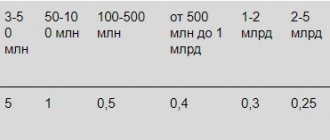In the Criminal Procedure Code of the Russian Federation today there are several articles of similar meaning that regulate criminal liability for damage caused by the theft of property values through the commission of various types of criminal acts.
These include:
- Art. 159 of the Criminal Code, regulating the degree of liability for fraud;
- Art. 7.2.1 of the Criminal Code, which establishes liability for causing damage by misappropriation of property values through abuse of trust or fraud;
- Art. 158 of the Criminal Code, regulating liability for theft;
- Article 7.27.1 of the Code of Administrative Offenses, which establishes liability for damage caused by petty theft.
The main and defining difference that separates them from each other is the size of the amount that serves as the basis for initiating a criminal investigation. In 2021, amendments were made to the Criminal Code under the articles listed above in the amount of amounts that trigger criminal liability.
The amount of damage, starting from which criminal or administrative punishment is imposed in 2021
In the Russian Criminal Code, Section 8, Chapter 21, which regulates liability for theft of material assets, federal bylaw number 323 - FZ in 2021 made the following amendments that are valid in the current 2021, liability for theft in the amount designated as:
- “large” comes starting from 250 thousand rubles;
- “especially large” – from 1 million rubles;
The amount of damage in case of theft from a civilian, designated as “significant”, is considered starting from 5 thousand rubles. This value can be adjusted taking into account the financial and property situation of the victim.
Petty, according to Part 1, Article 7.21 of the Administrative Code, is considered theft of no more than 1 thousand rubles. However, according to Part 2, Article 7.27 of the Administrative Code, such theft can be considered if the stolen amount is from 1–2.5 thousand rubles. That is, in the current legal field a kind of “sagging” has formed, which is expressed in the fact that the stolen amount ranges from 2.5–5 thousand rubles. can no longer be classified as an administrative offense and at the same time no criminal punishment has yet been imposed. This happened because the corresponding amendment was not made to the Administrative Code.
The concepts of “minor” and “significant” in relation to damage are absent in the text of the Civil Code of Russia. The Code defines various types of criminal acts causing property damage, for which administrative or criminal liability arises. The assistance of a lawyer in criminal cases is one of the main conditions that helps ensure that the investigative authorities correctly characterize the offense and obtain the maximum possible favorable decision in relation to the person who committed it.
Responsibility for theft - free criminal online consultation 24 hours
Hello! If you are on this page of our website, it means that you urgently need the help of a criminal lawyer under Article 158 of the Criminal Code of the Russian Federation “Theft”.
Yes, exactly “urgently”, because in criminal cases, as a rule, hours and even minutes are important. Inaction and delay in making a decision threatens with very serious consequences associated with deprivation of liberty.
You are lucky that our online criminal lawyers will provide you with absolutely free and highly qualified advice regarding your situation.
Therefore, do not waste precious time, this is an unaffordable luxury in criminal cases! If you need our help, then feel free to call us right now!
Also, you can leave your contact number in a special feedback form on the website, and our criminal lawyer will promptly call you back.
In addition, you can always contact our on-duty criminal lawyer for free through the special online advisory resource “ZhivoSite”. Please note that it is not a student intern who will communicate with you over the phone or via chat, but an experienced employee of our organization.
If your issue cannot be resolved through an online consultation by phone or chat, then you can always make an appointment for a free personal consultation with a criminal lawyer in our office.
Is liability for theft administrative or criminal? Lawyer Danila Bagrov explains : based on the practical activities of our Center’s criminal lawyers, thefts are one of the most common crimes committed by citizens, both in the Voronezh region and beyond.
In this regard, let us first turn to the Code of the Russian Federation on Administrative Offenses (CAO RF), namely to the content of Article 7.27. "Petit theft"
Part 1. Petty theft of someone else's property, the value of which does not exceed 1000 rubles, by theft, fraud, misappropriation or embezzlement in the absence of signs of crimes provided for in parts two, three and four of Art. 158, Article 158.1 of the Criminal Code of the Russian Federation, -
shall entail the imposition of an administrative fine in the amount of up to five times the value of the stolen property, but not less than 1000 rubles, or administrative arrest for up to fifteen days, or compulsory labor for up to fifty hours.
Part 2. Petty theft of someone else's property worth more than 1,000 rubles, but not more than 2,500 rubles through theft, fraud, misappropriation or embezzlement in the absence of signs of crimes provided for in parts two, three and four of Art. 158, Article 158.1 of the Criminal Code of the Russian Federation, -
shall entail the imposition of an administrative fine up to five times the value of the stolen property or administrative arrest for a period of ten to fifteen days or compulsory labor for a period of up to one hundred and twenty hours.”
Next, let us turn to the content of Article 158 of the Criminal Code of the Russian Federation dated June 13, 1996 N 63-FZ (as amended on December 19, 2016)
So, article 158. “Theft”
Part 1. Theft, that is, the secret theft of someone else’s property, -
shall be punishable by a fine in the amount of up to eighty thousand rubles, or in the amount of the wages or other income of the convicted person for a period of up to six months, or by compulsory labor for a term of up to three hundred sixty hours, or by corrective labor for a term of up to one year, or by restriction of liberty for a term of up to two years. , or forced labor for a term of up to two years, or arrest for a term of up to four months, or imprisonment for a term of up to two years.
Part 2. Theft committed:
a) by a group of persons by prior conspiracy;
b) with illegal entry into the premises or other storage;
c) causing significant damage to a citizen;
d) from clothes, bags or other hand luggage that were with the victim -
shall be punishable by a fine in the amount of up to two hundred thousand rubles, or in the amount of the wages or other income of the convicted person for a period of up to eighteen months, or by compulsory labor for a term of up to four hundred eighty hours, or by corrective labor for a term of up to two years, or by forced labor for a term of up to five years. with restriction of freedom for a term of up to one year or without it, or imprisonment for a term of up to five years with restriction of freedom for a term of up to one year or without it.
Part 3. Theft committed:
a) with illegal entry into a home;
b) from an oil pipeline, oil product pipeline, gas pipeline;
c) on a large scale, -
shall be punishable by a fine in the amount of one hundred thousand to five hundred thousand rubles, or in the amount of the wages or other income of the convicted person for a period of one to three years, or by forced labor for a term of up to five years with or without restriction of freedom for a term of up to one and a half years, or imprisonment for a term of up to six years with a fine in the amount of up to eighty thousand rubles or in the amount of the wages or other income of the convicted person for a period of up to six months or without it and with restriction of freedom for a term of up to one and a half years or without it.
Part 4. Theft committed:
a) an organized group;
b) on an especially large scale, -
shall be punishable by imprisonment for a term of up to ten years with or without a fine in the amount of up to one million rubles or in the amount of the wages or other income of the convicted person for a period of up to five years and with or without restriction of freedom for a term of up to two years.
Let's look at the notes for this article:
1. Theft refers to the illegal gratuitous seizure and (or) conversion of someone else’s property for the benefit of the perpetrator or other persons committed for personal gain and causing damage to the owner or other possessor of this property.
2. Significant damage to a citizen is determined taking into account his property status, but cannot be less than 5,000 rubles.
3. Premises are understood as buildings and structures, regardless of the form of ownership, intended for the temporary residence of people or the placement of material assets for production or other official purposes.
A storage facility refers to utility premises separated from residential buildings, areas of territory, pipelines, and other structures, regardless of the form of ownership, that are intended for permanent or temporary storage of material assets.
4. Large size is the value of property exceeding 250,000 rubles, and especially large - 1,000,000 rubles.
Also, the relatively new criminal article 158.1, introduced on July 3, 2016 by Federal Law N 323-FZ, is very relevant. “Petty theft committed by a person subjected to administrative punishment”
This criminal article deals with petty theft of someone else's property, repeatedly committed by a person who has previously been subjected to administrative punishment for petty theft, provided for in Part 2 of Article 7.27 of the Code of Administrative Offenses of the Russian Federation -
shall be punishable by a fine in the amount of up to forty thousand rubles, or in the amount of the wages or other income of the convicted person for a period of up to three months, or by compulsory labor for a term of up to one hundred and eighty hours, or by corrective labor for a term of up to six months, or by restriction of liberty for a term of up to one year. , or forced labor for a term of up to one year, or arrest for a term of up to two months, or imprisonment for a term of up to one year.
If we move away from the official texts of legislative documents, then based, again, on the practice of citizens’ appeals to the criminal lawyers of the Legal Center, we can draw certain conclusions: - Numerous shops, shopping centers and supermarkets that use a self-service system, of course, are created for our convenience. The self-service system allows us to choose without haste what we like, and not what the seller gives us. Also, I’ll tell you a little secret that, in principle, every marketer should know - if the product is physically available to us, and we can touch it, feel it, smell it, etc. etc., then such a product sells much better than one lying under the glass of the counter.
— At the same time, this practice of self-service also has, undoubtedly, a negative point - the availability of goods has led to massive and regular thefts due to this same availability.
Let's move on to specifics about liability for theft. What are the consequences for citizens of theft of up to 2,500 rubles? Before talking about the impending liability for theft, you need to understand the qualifications of the crime, of which there are a great many in criminal and administrative legislation. So, shoplifting up to 2500 rubles. belongs to the category of petty theft and is punishable in accordance with the norms of the Code of Administrative Offenses of the Russian Federation. But this is true for those cases when the crime was completed and the thief managed to dispose of the stolen property. What does it mean to dispose? This is if a citizen stole, for example, a stick of sausage and managed to eat it by the time he was caught. If this did not happen, and the thief was detained at the exit from the outlet with that same sausage, then the crime is classified as attempted petty theft.
But theft in the amount of more than 2,500 rubles, and at current prices this is not so much (!) - this is already a criminal offense with serious punishment. However, it must be borne in mind that, based on the explanations of the Supreme Court of the Russian Federation, the amount of damage is calculated based on the actual cost of the goods, determined in accordance with the purchase price or by conducting a merchandising examination. In other words, when qualifying a crime, the retail markup should not be taken into account. For example, if a citizen stole three bottles of cognac with a total cost of 2,600 rubles, but the retail outlet purchased them at a price of 500 rubles per bottle (total 1,500 rubles), then the crime is considered petty theft.
Please note that the Administrative Code (Administrative Code of the Russian Federation) does not provide for liability for attempted petty theft. Therefore, if the stolen goods are seized upon leaving a retail establishment or at the checkout, the citizen can get away with apologies and promises not to give in to illegal temptations in the future. Also, a citizen is absolutely not obliged to pay damages or any fines or penalties to a trading establishment if its employees are forced to do this in order to “hush up” the theft. In fact, there is no “case” and cannot be if the citizen acted alone.
But attempted theft for an amount less than 2,500 rubles, committed by a group of persons, falls under the norms of Part 3 of Article 30 of the Criminal Code of the Russian Federation. Here the citizen faces no more than ¾ of the maximum possible sentence that the citizen could be sentenced to for a completed crime. For example, if the article provides for the maximum possible punishment of 2 years in prison, then a citizen guilty of theft may be sentenced to imprisonment for a term of no more than 1.5 years. If, nevertheless, a crime has taken place and the offense is recognized as completed, petty theft is punishable in accordance with Art. 7.27 Code of Administrative Offences.
Theft in an amount exceeding 2,500 rubles is classified as a criminal offense and is punishable in accordance with Art. 158 of the Criminal Code of the Russian Federation
Cases of repeated criminal acts (both theft and petty theft) are punishable by the same articles of the Criminal Code. However, recidivism of crimes is a basis for awarding a more serious penalty. For example, if the first time the court imposed a fine of an insignificant amount, then a repeated crime may entail punishment in the amount of the maximum possible fine or imprisonment.
It is worth noting that this relaxation does not apply to those types of thefts that are called qualified - these are pocket, apartment and group crimes. Also, the law will not spare those who repeatedly commit petty theft. Recidivism will be punished very harshly.
I strongly recommend that individual citizens who are prone to misappropriation of other people’s property do not rejoice in the absence of a criminal record and slowly steal from commercial establishments, hoping that they will not be caught and held accountable for theft. Practice shows that any crime will someday be proven, especially if it is committed with aggravating circumstances. Therefore, you should not count on concessions from the law or the judge...
Dear Voronezh residents! If you or your friends and family need consultation, advice, assistance, support and defense of a criminal lawyer, contact the specialists of Legal. Here you will definitely be helped to defend your legal rights and freedoms, as well as bring the perpetrators to legal responsibility and punishment.
PS Dear readers! Despite the fact that our legal organization is located in Voronezh, visitors to our official website are residents of almost all regions of our country.
Of course, we provide legal assistance, first of all, to citizens living in the Voronezh region.
At the same time, every day dozens of people from all over our country, thanks to our legal articles and competent legal advice posted on our official website, successfully solve their pressing problems and improve the level of their legal literacy.
At the same time, there are a number of areas of our activity in which we can provide legal support to citizens remotely, regardless of their location.
In particular, we are talking about remote assistance that our credit lawyers effectively provide to debtors of banks and microfinance organizations.
In this case, we are talking about canceling court orders for debt collection, maintaining a competent dialogue with debt collectors and correctly responding to letters and calls from banks.
Also, since October 2015, we have been successfully providing comprehensive legal support for bankruptcy procedures for individuals.
If you have questions on the above topics, you can ask them in the feedback forms on our website, and our employees will discuss them with you in more detail and offer you effective solutions, regardless of your place of residence.
Material prepared by lawyer Danila Bagrov
How is the amount of damage determined in conditions of instability of the domestic currency?
In various by-laws, as well as the Letter of the Plenum of the Supreme Court, analyzing the judicial practice of office work on robberies, robberies and thefts, one can find the following rules establishing the procedure for determining the amount of damage.
- The amount of damage is determined by the value of property assets on the date of theft.
- If there is no information about the value of stolen material assets, the investigation turns to experts and makes an assessment based on their findings.
- The amount of damage caused by theft that must be compensated is determined based on the calculation of the value of property assets at the time of the court decision. It is possible to carry out indexation to the date of execution of the court decision, if such a need arises.
- For historical, artistic and scientific values there is a separate procedure for calculating the cost. It is determined on the basis of the findings of the examination, which indicates their significance and cost.
- If disagreements arise, an independent third-party examination is invited.
Seven facts in the article that you should pay attention to:
- On July 3, 2017, amendments were made to the Criminal Code of Russia that significantly changed the amount of damage, if exceeded, liability arises as a result of theft or fraud in business activities.
- If damage amounts to 5 thousand rubles. criminal liability arises. If the amount of damage is less - administrative.
- Persons convicted of damages caused by theft or fraud in business activities have the right to file petitions asking for release or a reduced sentence.
- In accordance with amendments made in 2021 to Article 76.1 of the Criminal Code of Russia, it is possible to mitigate the punishment or cancel it if four criteria are met, for example, compensation for the damage caused before the start of the investigation.
- The amount of damage caused by robbery, robbery or theft is determined by the value of property assets on the date of the commission of the criminal act. If necessary, an appropriate examination is prescribed.
- The 2021 amendments to the Criminal Code of Russia introduced a gradation of the amount of damage into “large” (more than 250 thousand rubles) and “especially large” (more than 1 million rubles).
- Designations such as “minor” or “significant” damage are not used in the legal field and are used only in everyday life.
A good criminal lawyer will help you understand the current situation, choose the right course of action and defend the interests of your client.
Possible changes
Just recently we heard representatives of the penitentiary service who have long been talking about the fact that a large number of people are serving sentences for “minor” thefts. A bill is being considered in the State Duma, according to which it is planned to raise the bar for petty theft from 1 to 5 thousand rubles. In addition, a new measure of liability for this act will be introduced - compulsory work for up to 50 hours. The question of how much damage is considered a crime will always have to be dealt with.
Law enforcement officials say that these measures will indicate better prevention of thefts in the future. In addition, this particular amount and penalties are fully consistent with the public danger from petty theft.
It is planned to highlight repeated petty theft as a separate article. This will include all thefts that occur within a year of the first act. Responsibility measures have already presumably been selected. The person is punished, ranging from a fine of up to 80 thousand rubles and ending with actual imprisonment of up to 2 years.
In addition, the new changes plan to adjust the lower limit of significant damage to at least 10 thousand rubles. After all, it is this criterion that is used to qualify many other crimes against property against a person who has broken the law and stolen.
For any questions, you can contact a lawyer for a free consultation by phone or online.
What is the penalty for theft with complicity?
Committing a crime as part of a group of persons by prior conspiracy is a qualifying feature. This increases the severity of the punishment. In this case, liability will arise under paragraph “a” of Part 2 of Art. 158 of the Criminal Code of the Russian Federation. Punishment includes imprisonment for up to 5 years. Committing theft as part of an organized group is punishable most severely - up to 10 years in prison. In this case, liability arises under paragraph “a” of Part 4 of Art. 158 of the Criminal Code of the Russian Federation.
Note! If the theft is committed in complicity, there can be no talk of any administrative liability. A criminal case is initiated even if the value of the stolen property is less than 1,000 rubles.
Theft on a significant, large and especially large scale - what the threat is
Depending on the value of the stolen property, theft is classified under different parts of Art. 158 of the Criminal Code of the Russian Federation. Theft with significant damage - from 5,000 to 250,000 rubles. Punishable by up to 5 years in prison. Liability is provided for in paragraph “c” of Part 2 of Art. 158 of the Criminal Code of the Russian Federation.
Note! To qualify a crime under this point, it is necessary to prove that for the victim the amount of the stolen goods is truly significant.
Grand theft carries a severe penalty of up to 6 years in prison. Such thefts include theft of property worth from 250,000 to 1 million rubles. If more than 1 million rubles are stolen, the punishment will be even more severe - as for theft by an organized group - up to 10 years in prison. As we can see, punishment for theft varies from an administrative fine to a decade in prison. In one of the previous articles, we discussed the issue of how to terminate a criminal case for theft. If you do not want to independently develop a line of defense in the case, contact a competent theft lawyer.
What is the penalty for burglary from a home or building?
Theft committed from a home is punished very strictly - up to 6 years in prison. Liability is provided for in paragraph “a” of Part 3 of Art. 158 of the Criminal Code of the Russian Federation and this crime is classified as serious. Theft from premises (for example, a barn, garage, bathhouse, utility block) entails liability under paragraph “b” of Part 2 of Art. 158 of the Criminal Code of the Russian Federation. Punishment can be up to 5 years in prison.
Note! To qualify as a crime of entry, it is necessary to prove that the thief was illegally in the premises or home. For example, theft by a guest will not count as trespassing if the guest was invited by the host himself.
What punishment will a person under 18 years of age suffer?
According to Art. 87 of the Criminal Code of the Russian Federation, minors are persons from 14 to 18 years old. For committing theft, a minor can either be punished or educational measures can be applied to him.
Let us schematically depict the types and features of punishments that can be applied for theft committed by a minor:
| Type of punishment | Peculiarities |
| Fine | Amount : from 1,000 to 50,000 rubles / wages of a minor for a period of 2 weeks to 6 months Can be collected from parents/adoptive parents with their consent |
| Mandatory work | Term: from 40 to 160 hours in free time from study or work Minor aged 14 - 15 years: maximum 2 hours per day. Minor aged 15 - 16 years: maximum 3 hours per day. |
| Correctional work | Term: from 2 months to 1 year. General rule: can only be appointed from 16 years of age. Exception : can be assigned to a minor aged 14-15 years if he is officially employed. |
| Restriction of freedom | Duration : from 2 months to 2 years. |
| Deprivation of liberty |
|
Let us note that the specific type of punishment is established by the court individually after carefully studying all the circumstances of the theft, as well as the identity of the minor.







